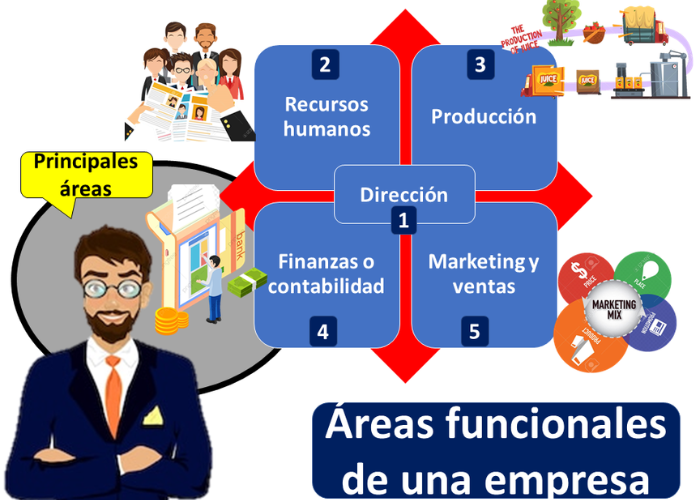Functional areas play a vital role in the success of any company. These areas are responsible for managing specific tasks and functions within an organization, ensuring that everything runs smoothly and efficiently. Each functional area has its own unique set of responsibilities and goals, all working towards the overall success of the company. In this article, we will explore the importance of functional areas in a company and delve into the key functional areas that exist in most organizations.
Importance of functional areas in a company
Functional areas are essential for the smooth operation of a company. They provide structure and organization, ensuring that each aspect of the business is properly managed and coordinated. Without functional areas, companies would struggle to effectively manage their operations, resulting in confusion, inefficiency, and ultimately, a decline in productivity.
One of the main benefits of functional areas is that they allow for specialization. Each area focuses on a specific aspect of the business, allowing employees to develop expertise in their respective fields. This specialization leads to increased efficiency and effectiveness, as employees become proficient in their specific area and can contribute more effectively to the company’s overall goals.
Functional areas also promote accountability and responsibility within an organization. With clear roles and responsibilities assigned to each area, employees are aware of their duties and are held accountable for their performance. This not only improves individual performance but also fosters a sense of ownership and commitment to the company’s success.
Additionally, functional areas facilitate effective communication and collaboration within an organization. With clear lines of communication and coordination between departments, information flows smoothly, ensuring that everyone is on the same page and working towards the same objectives. This collaboration allows for better decision-making, problem-solving, and innovation, as different perspectives and expertise are brought together to tackle challenges.
Key functional areas in a company
While the specific functional areas may vary depending on the size and nature of the company, there are several key areas that exist in most organizations. These include the human resources department, marketing and sales department, finance and accounting department, operations and production department, and information technology department.
Human resources department
The human resources department is responsible for managing the company’s most valuable asset – its employees. This department handles all aspects of the employee lifecycle, from recruitment and selection to training and development, performance management, and employee relations. The HR department ensures that the company has the right people in the right roles, with the necessary skills and capabilities to drive the company’s success.
The HR department plays a crucial role in fostering a positive work environment and promoting employee engagement. They are responsible for implementing policies and programs that support employee well-being, satisfaction, and growth. Additionally, the HR department handles employee benefits, compensation, and compliance with labor laws and regulations.
Marketing and sales department
The marketing and sales department is responsible for promoting the company’s products or services and driving revenue growth. This department develops and executes marketing strategies, conducts market research, identifies target markets, and creates marketing campaigns to reach and attract customers. They work closely with the sales team to generate leads, convert them into customers, and maximize sales opportunities.
The marketing and sales department is crucial for building brand awareness, creating customer demand, and maintaining customer relationships. They analyze market trends, customer preferences, and competitive landscape to develop effective marketing strategies that align with the company’s overall objectives. Additionally, they monitor sales performance, track customer feedback, and continuously refine their marketing and sales strategies to stay ahead in the market.
Finance and accounting department
The finance and accounting department is responsible for managing the company’s financial resources, ensuring financial stability, and providing accurate financial information to support decision-making. This department handles financial planning, budgeting, and forecasting, as well as financial analysis and reporting. They also manage cash flow, accounts payable and receivable, and taxation.
The finance and accounting department plays a critical role in ensuring the company’s financial health and sustainability. They monitor financial performance, analyze financial data, and provide insights and recommendations to improve profitability and efficiency. Additionally, they ensure compliance with financial regulations and standards, manage financial risks and support strategic financial planning.
Operations and production department
The operations and production department is responsible for managing the company’s production processes and delivering products or services to customers. This department oversees the entire production cycle, from sourcing and procurement to manufacturing or service delivery and quality control. They optimize production processes, manage inventory, and ensure efficient resource allocation.
The operations and production department focuses on maximizing operational efficiency, reducing costs, and improving productivity. They analyze production data, identify bottlenecks or inefficiencies, and implement process improvements to enhance overall performance. Additionally, they collaborate with other departments to align production with customer demands and market trends, ensuring timely delivery and customer satisfaction.
Information technology department
The information technology department is responsible for managing the company’s technology infrastructure and systems. This department handles hardware and software procurement, network and systems administration, data management and security, and IT support. They ensure that the company’s technology resources are reliable, secure, and aligned with business needs.
The IT department plays a crucial role in enabling digital transformation and innovation within the company. They leverage technology to streamline business processes, enhance communication and collaboration, and improve overall efficiency. Additionally, they monitor and analyze technology trends, assess emerging technologies, and recommend strategic investments to drive the company’s growth and competitiveness.
Cross-functional collaboration
While each functional area has its own specific responsibilities, it is essential for them to collaborate and work together towards common goals. Cross-functional collaboration refers to the integration and coordination of efforts across different functional areas to achieve shared objectives.
Cross-functional collaboration is crucial for driving innovation, problem-solving, and continuous improvement within an organization. When employees from different functional areas come together, they bring diverse perspectives, expertise, and ideas to the table. This collaboration fosters creativity and allows for a holistic approach to decision-making and problem-solving.
Additionally, cross-functional collaboration promotes effective communication and knowledge sharing within an organization. It breaks down silos and encourages employees to work together, share information, and learn from each other. This collaboration not only improves overall organizational performance but also enhances employee satisfaction and engagement.
To foster cross-functional collaboration, organizations can implement various strategies and practices. These include creating cross-functional teams or task forces, organizing regular meetings or workshops to facilitate communication and collaboration, and establishing a culture that values and promotes collaboration across functional areas.
Conclusion
Functional areas are the building blocks of a successful company. They provide structure, specialization, and accountability, ensuring that each aspect of the business is effectively managed. The key functional areas, including human resources, marketing and sales, finance and accounting, operations and production, and information technology, play unique and vital roles in driving the company’s success.
The cross-functional collaboration further enhances the effectiveness and efficiency of these functional areas by promoting communication, collaboration, and innovation. When employees from different areas come together, they bring diverse perspectives and expertise, resulting in better decision-making and problem-solving.
By understanding and leveraging the importance of functional areas and promoting cross-functional collaboration, companies can optimize their operations, drive growth, and stay competitive in today’s dynamic business environment.




